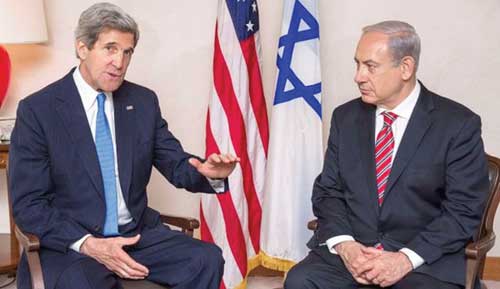.jpg)
JERUSALEM —Secretary of State John Kerry was in Israel last Sunday to reassure Prime Minister Bibi Netanyahu that the U.S./Russia deal to secure Syria’s chemical weapons does not diminish American resolve to prevent Iran from gaining a nuclear weapon. Kerry also briefed Bibi on what he called “the most far-reaching chemical weapons removal ever.”
Before he met with Kerry, the Prime Minister attended a commemoration of the 40th anniversary of the Yom Kippur War and said, “We hope the understandings that have been achieved between the U.S. and Russia regarding Syria’s chemical weapons will show results, and these understandings will be tested by results—the full destruction of the stocks of chemical weapons that the Syrian regime has used against its own people. …We must also judge the results of the efforts of the international community to stop Iran’s nuclear armament,” he said. “Here as well, it is not words that will determine the outcome but rather actions and results.”
After a four-hour long meeting with Bibi, Kerry also sent a strong message to Syria, and reiterated that “The threat of force remains, the threat is real. Make no mistake, we have taken no options off the table,” he warned, if Assad does not carry out an internationally brokered agreement to hand over its chemical weapons.
“We cannot have hollow words in the conduct of international affairs, because that affects all other issues, whether Iran or North Korea or others,” Kerry told the media after the meeting.
“The Syrian regime must be stripped of all its chemical weapons,” said Netanyahu, standing with Kerry. “That would make our entire region a lot safer, “ he said, and drew an analogy with Iran’s nuclear programs. “The world needs to ensure that radical regimes don’t have weapons of mass destruction because, as we’ve learned once again in Syria, if rogue regimes have weapons of mass destruction they will use them. If diplomacy has any chance to work it must be coupled with a credible military threat. What is true of… Syria is true of Iran.”
Kerry described the deal on the Syrian weapons as “the most far-reaching chemical weapons removal effort” ever, [see the agreement on page 19] and said it would “only be as effective as its implementation… [Israel] understands the words ‘never again’ perhaps more than any other,” he said, referring to the Holocaust.
Said Bibi, “Indeed, these understandings will be tested by results: the full destruction of the stocks of chemical weapons that the Syrian regime has used against its own people. … The determination the international community shows regarding Syria will have a direct impact on the Syrian regime’s patron Iran. Iran must understand the consequences of its continual defiance of the international community by its pursuit towards nuclear weapons.”
When pressed on the status of the peace talks between Israel and the Palestinians, as the focus was on Syria’s chemical weapons and the U.S. agreement with Russia to clear them out, both Kerry and Netanyahu kept it short and to the point. Kerry said, “We are convinced that the best way to try to work through the difficult choices that have to be made is to do so privately. We will not discuss the substance of what we are working on.”
Netanyahu said, “We both know that this road is not an easy one but we’ve embarked on this effort with you in order to succeed, to bring about a historic reconciliation between Israelis and Palestinians that ends the conflict once and for all.”
Kerry then took off for Pairs to discuss the Syria deal with his counterparts from Saudi Arabia, France, Britain, Germany, and Turkey.
President Obama told ABC’s George Stephanopulous on “This Week” that Iran understands that its nuclear program is “a far larger issue for us” than the use of chemical weapons in Syria and that the threat a nuclear-armed Iran would pose to Israel “is much closer to our core interests.” He said he was in “indirect” communication with the Iranian leadership. He said he and Hassan Rouhani, Iranian President, have exchanged letters about the Syrian situation and Tehran understood that a potential nuclear-armed Iran “is a far larger issue” for the United States.
“In any case, Israel must be poised and ready to defend itself, by itself, against any threat and this capability and readiness are more important now than ever,” Obama said. “My suspicion is that the Iranians recognize they shouldn’t draw a lesson that we haven’t struck [Syria], to think we won’t strike Iran.”










